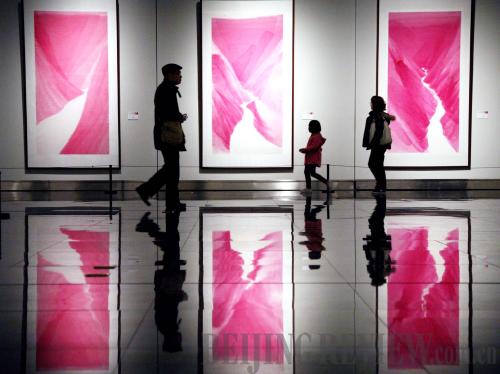|
 |
|
MORE CHANCES TO APPRECIATE ART: Visitors appreciate art pieces at the Jiangsu Provincial Art Museum in Nanjing (WANG XIN) |
In two years, Chinese citizens will not have to pay to enter public art galleries, the Ministry of Culture and the Ministry of Finance jointly announced on February 10.
Public art museums at national and provincial levels will stop charging admission and all public libraries and cultural centers are to have barrier-free, zero-threshold access by the end of this year.
Other levels of art galleries are expected to be opened to the public for free before the end of 2012. All public facilities and spaces providing basic services will be free of charge.
This is another significant move to promote the construction of a public cultural services system that started in 2008, when all memorial halls were opened to the public for free.
For a long time, art museums, libraries and other public institutions in China have been seen as remote from the general public. The moves are aimed at changing that situation.
A boon for art lovers
The announcement says services and facilities of art galleries and public libraries previously offered to paying entrants must remain free of charge.
Fees for accreditation verification, bag storage, study room use and electronic reading room Internet access will all be cancelled.
Meanwhile, cultural centers' public art counseling and training costs, as well as costs for amateur art support and charges for public lectures and exhibitions will also be eventually cancelled.
In addition to fees for basic public services, public libraries and cultural centers will be able to charge reasonable fees for public welfare services, such as in-depth consultation and cultural centers' high-end art training.
In establishing the financial mechanism to ensure funding, public libraries and cultural centers at all levels should put their energy into developing basic public cultural services, the statement said.
"This is definitely a boon for art lovers and culture vultures in China," said Fan Di'an, Dean of the National Art Museum of China.
He said it was vital for the public to share the fruits of cultural development.
In recent years, the nation's top art museum has offered discounts to the public when it put important exhibitions on display, while striving to offer better services, Fan said.
In early 2008, when a grand exhibition on the art of the Dunhuang Grottoes took place at the museum, a record number of more than 600,000 people attended the show in two months.
In mid-January, a library in east China made headlines when it publicly invited the disadvantaged, including beggars, to use its services.
The Hangzhou Public Library in Zhejiang Province has been open for free to the public since 2008, even while other public institutions had unwritten rules and deposit requirements that kept the disadvantaged away.
The library's head librarian Chu Shuqing said, "I don't have the right to keep anyone away from the library, but anyone (who doesn't agree) has the right to leave."
Since a library is for the public, it should welcome all and should not judge anyone before investigation, said Liu Lidong, a publicity manager at the library.
"It's common to see beggars and migrant workers reading in our library," Liu said. "Instead of wanting to be in the air conditioning in the summer and heating in the winter, they come here to read."
"Libraries should be open and free, since all readers are equal," said Cheng Huanwen, Director of the Guangdong Library Society.
Cheng said the right to read and learn must be respected. Even so, libraries can take steps to smooth relations between disadvantaged patrons and other guests.
One suggestion he made was that public libraries offer free baths for beggars, which might help to make other readers feel more comfortable.
| 